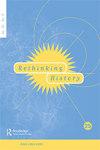语言转向的另一面:历史理论与人性谈判
IF 0.8
2区 历史学
Q1 HISTORY
引用次数: 0
摘要
在历史理论领域中,我们看到了一种与过去妥协的努力,即海登·怀特的“元历史”之后出现的语言转向和具体的叙事主义辩论。然而,“语言转向”指的是20世纪人文学科更广泛的转变。在琼·斯科特(Joan W. Scott)的著作中,我们发现了历史理论、性别研究和特定后结构主义类型的语言转向立场之间的范式交叉。在反思怀特和斯科特的作品时,我展示了他们对叙事和身份的批评是如何相遇的,以及女性主义理论和历史领域的发展是如何与那些对推进历史理论讨论感兴趣的人相关的。本文旨在唤起我们对边缘化群体的斗争如何迫使学术界内外正在进行的人性条款谈判的关注。我想起了怀特关于中音的想法,特别是他的主张,即我们必须重新思考历史写作的代理人与其写作之间的关系。我认为,女权主义斗争和理论化使我们能够重新定义假设一种声音的概念,这是一个过程,它涉及到对我们所接受的身份的去除和重写:就像中间声音写作一样。本文章由计算机程序翻译,如有差异,请以英文原文为准。
The other side of the linguistic turn: theory of history and the negotiation of humanity
ABSTRACT We have witnessed in the field of theory of history an effort to come to terms with its past, namely, the linguistic turn and the specific narrativist debate that emerged after Hayden White’s Metahistory. However, ‘linguistic turn’ refers to a broader shift in twentieth-century Humanities. In the writings by Joan W. Scott, we find a paradigmatic intersection between theory of history, gender studies and a linguistic turn-stance of a specific poststructuralist kind. Reflecting on White’s and Scott’s work, I show how their criticisms of narrative and identity meet and how developments in the fields of feminist theory and history become relevant for those interested in moving forward discussions in theory of history. This paper aims at calling our attention to how marginalized groups' struggles have forced an ongoing negotiation of the terms of humanity within and beyond academia. I recall White’s thoughts around middle-voice, specifically his claim that we have to rethink the relationship between the agent of historical writing and its writing. I claim that feminist struggles and theorization allow us to refigure the idea of assuming a voice as a process that involves as much disidentification from, as rewriting of, our received identities: as middle voice writing.
求助全文
通过发布文献求助,成功后即可免费获取论文全文。
去求助
来源期刊

Rethinking History
Multiple-
CiteScore
1.20
自引率
0.00%
发文量
26
期刊介绍:
This acclaimed journal allows historians in a broad range of specialities to experiment with new ways of presenting and interpreting history. Rethinking History challenges the accepted ways of doing history and rethinks the traditional paradigms, providing a unique forum in which practitioners and theorists can debate and expand the boundaries of the discipline.
 求助内容:
求助内容: 应助结果提醒方式:
应助结果提醒方式:


